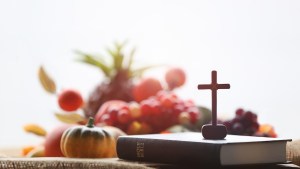Being grateful doesn’t usually occur spontaneously, unlike very young children who marvel at everything and know how to be thankful without it costing them anything. How can we train ourselves to be habitually grateful again? By adopting the practice of reliving beautiful moments, according to the 3-step method recommended by Father Lionel Dalle.
“Gratitude is powerful because of all acts, it’s the one that most transforms the very depths of our hearts. If psychology proves that gratitude is at the root of our well-being, theology and philosophy explain it by showing that it touches us and transforms us in the most intimate part of our being,” writes Father Pascal Ide, who has written extensively on gratitude. For it to have its full transforming effect, however, we need to practice gratitude on a daily basis. Fr. Lionel Dalle, a priest of the Diocese of Toulon, and also the author of a book on gratitude, suggests concrete ways by which we may gradually acquire the habit of gratitude and thus enter into a new life with Jesus.
Practicing gratitude requires a little work. “If you want to acquire the virtue of gratitude, it’s necessary to repeat a multitude of small exercises, so that it is ingrained in you, a little like weight training,” he says. Here is one of the exercises proposed by Father Dalle: it is a question of experiencing gratitude by frequently reliving beautiful moments of our life according to the three steps of gratitude. So what are these three steps?
The 3 steps
Recognize the good things we have received. Become aware of the beauty of a landscape, of an event that went well, of a grace that God has given you. Visualize, as precisely as possible, all the details of this good thing: What was/is it? Where did you enjoy it? Under what circumstances? Who was present? This stage of gratitude process involves using our minds to reflect and value the benefits we’ve received (the head).
Relive the good sentiments that this benefit has aroused in you, such as wonder, gratitude, joy, pride. Here, it’s a matter of the heart, not the head.
Give thanks for this blessing by taking action: thanking the people at the origin of the blessing, giving to others in turn, praising the Lord. The act of thanking is related to the will (which we can picture as our hands).
Thus, gratitude involves our head, our heart, and our hands, opening us up to recognize the good we have received and turning us outwards towards others to thank them and to do good to others in return. Making this 3-step method a habit will make us more positive, selfless, and constructive people.
Let’s conclude with this wise remark by Meister Eckhart, a medieval philosopher, theologian, and mystic: “If you thank God for all the joys he gives you, you will have no time left to complain.”



